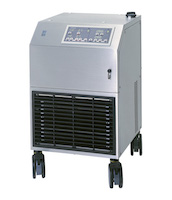
The samples were obtained from patients and matched to a group of the defective heater-coolers with “a high degree of similarity” through the use of whole-genome sequencing. The link that runs between the samples and the heater-cooler units is mycobacterium chimaera, an organism typically found in soil and water. Professor Stefan Niemann, a co-author of the study, says that the discovery “closes the missing gap” in understanding how so many heater-cooler units could have become contaminated, leaving hundreds of thousands of patients at risk.
HCUs are used to regulate patients’ blood and tissue temperatures in more than 250,000 procedures in the US every year. One model — the Stockert 3T — is used in roughly 60 percent of those procedures and may pose particular risk, as the FDA has previously named it as a unit of concern. The 3T is manufactured by Sorin, which became part of LivaNova as a result of a 2015 merger.
Heater-cooler units have been found to aerosolize nontuberculosis mycobacterium, or NTM, through their exhaust fans. While NTM is hardly a concern for a healthy person, it can be extremely dangerous for a patient undergoing complicated procedures like open-heart surgery because their immune system is already compromised. At that point, any infection whatsoever can prove to be deadly.
At this point, Dr. Michael Edmond, a professor of clinical diseases at University of Iowa hospitals and clinics, doesn’t feel confident in the likelihood of HCUs ever being fully decontaminated. Instead, he says, “the only mitigation strategy is…to separate the air that comes out of that machine from the air in the operating room” by placing them in isolated quarters.
NTM infections can take months or even years to manifest, and the prevalence of heater-cooler units used in intricate procedures makes knowing the the symptoms of such an infection critical. They include night sweats, aches and pains, unexplained weight loss, fatigue, and fever. A healthcare professional or patient recognizing an NTM infection in time could be the thing that saves that patient’s life.
